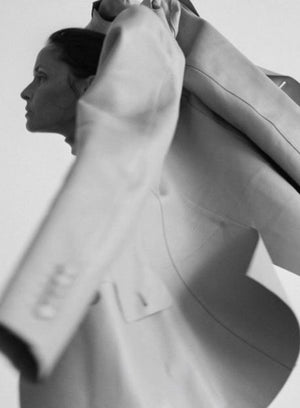Q&A with Sèchey Founder, Emily Heintz

-- by Jessie Gabriel
Admittedly, I am a sucker for a great founder story. How I Built This, Second Life, Entreprenista, Venture Unlocked, I listen to them all. As an entrepreneur, I am always looking for advice and inspiration from others who speak openly about the agony and ecstasy of this life we have chosen. Fortunately for me, my job is to work with (and learn from) these remarkable individuals. And we want to share the brilliance of our community with you, which is why we are launching this.
Now to the particular entrepreneur we’re speaking with today: Emily Heintz! She is the founder and CEO of Sèchey, which is the lifestyle brand for the no-and lo-alcohol community. Emily is definitely a timely choice for April 2024. As we (very) slowly emerge from the worst fundraising environment in quite some time, many founders are wondering how they will survive if things don’t pick up right quick. In other words, how do you thrive when you have a high-growth-potential company but no access to outside capital?
What was your vision for Sèchey when you launched and how has it evolved? My vision for Sèchey was to increase the availability, awareness, and convenience of alcohol-free options. In my personal journey with alcohol, I had to work really hard to discover alternatives and they weren't always readily available. So I thought, if I'm having this challenge, I'm sure there's other people in the same boat. I initially wanted Sèchey to be a multi-brand retail concept, the Sephora of non-alc. As the vision evolved with the company, I recognized that people were resonating very strongly with the brand and lifestyle choice to be alcohol flexible and were thinking more about the way that we consume alcohol. Sèchey means dryish, so when it was initially launched, it was a dryish retailer. And now we're a lifestyle brand focused on the consumer’s personal journey with alcohol, which is not exactly a straight line.
Tell us a little bit about your fundraising, let’s call it, “journey”? I bought the Sèchey domain name in 2020 and launched in September 2021 as an e-commerce business. I was literally driving our products around Charleston. At the time, I was working to support the business but I knew there was going to be a time when I was going to need to devote my entire day to building the business and that required capital. I initially thought because I was a solo female founder, that the journey would involve some degree of . . . I don't know if deference is the right word. But I thought, “I’m a female entrepreneur” and there's money out there for women-owned businesses, right? There was even a time I thought I could raise money from all women. Then I recognized very quickly that the actual amount of funding that goes to women is very small.
How were you able to continue to hustle during that fundraising struggle? I really just had to stay positive every day. I knew I was going to get a lot of no’s and my background in sales was helpful. Because in sales, you get told no all the time and you learn to not take it personally. When it's your own business, it's easier to take it personally than when you're selling someone else's software. So that was an adjustment. Then I went to my network and I believed so strongly (and still do) in building a billion-dollar brand that I just didn't let it bother me.
We’re thrilled about your partnership with Target. How did this collaboration come about? The no/low alcohol movement is a trend and Target follows trends very closely. I was introduced to them to discuss the no/low movement, but because I have a background in retail I pitched them on Sèchey (seh shay’) for Target (tar zhay’). How can I help guide Target through a new category that's very quickly being flooded with brands. And because I was an early adopter, how do we present a curated, non-alcoholic statement together? We really evolved together to think about what resonates with the Target guest. This isn't about sobriety, it's about offering options. And the optionality is what drove the partnership. Sèchey’s assortment is part of a much larger initiative for Target around wellness. I look at the non-alcoholic movement and it's truly about wellness much like what happened with skincare. We started to think about what we were putting on our skin. What we are consuming in our celebration and socialization is what we're putting in our bodies. It could be alcoholic, organic, low-sugar, etc.
Plenty of founders (and investors) are scared of retail. Why do you think retail is so valuable? Retail is at the heart of the customer experience and customer discovery. This category is perfect for retail because the best way to get educated and discover and develop a relationship with a brand is in the physical space.
No and low alc is such a thing now. How did you see it was coming and what do you think has most inspired this movement? I have my own personal relationship doing dry January (I just celebrated my fifth). During that process, as I was educating myself with literature on quitting, I saw us all looking at alcohol with more curiosity. I think what's most inspired the movement: you feel better and you're more mindful. In addition to alcohol flexibility, we talk a lot about mindful consumption. Our tagline is “drink less, live more.” When I do choose to have a glass of wine or if I do choose to over-imbibe, it's a choice.
Now you are not just a marketplace, but you sell your own products as well. How did that happen? We accelerated with a branded product because customers love the brand so much. It was always part of the plan, but it actually happened a lot faster than I expected. Now we have an exclusive dealcoholized wine at Target and I'm bringing in an organic wine from France. There's also a world where not all of our products are going to be dealcoholized. So it's been a really interesting journey to hear feedback from customers that they actually do consume alcohol. And most of them are cool with what's being called “neo-prohibition.” You have your relationship with alcohol and Sèchey exists for you to engage with alcohol however you feel like engaging with it.
What advice do you have for aspiring female entrepreneurs looking to enter the startup ecosystem, particularly in the food and beverage industry? Food and beverage is still very male dominated. So be prepared that while yes, everyone talks about supporting female entrepreneurs, it's still really hard. I think my advice would be that you really have to believe in what you’re doing without any external validation. Because you're going to hear so many no’s and so much negativity. It has to come from the inside and then run with it. I’d also say to be mindful in choosing partners. I chose All Places because I was introduced by other powerful women and because they have a focus on the unique challenges of female entrepreneurs that makes me feel supported, protected and understood in a way that’s hard to replicate. They’ve been such a great partner from the beginning and why they will continue to be, because it's a viewpoint that is hard to replicate.
Being a founder can be so hard. It’s important that we each remember to celebrate the moments of success and joy. Can you share one of your moments of true founder elation? Getting the email that Sèchey wine was going to be on Target shelves was probably my number one. In general, when I'm having a bad day, or I'm struggling, the best way to find that elation is to talk to your customers. If you're doing what you say you're doing, your customers are going to be the ones that truly support you. They’re the ones that are consuming and believing in your products and your vision. The last thing I'll say is, “this too shall pass.” The excitement of being on Target shelves, yes, that was exciting. But there was a lot around it that was hard. For me, it’s about not getting too excited or too upset about any one thing.
What are you doing now to manage the anxiety that comes with being a founder? I'm really looking at my quality of life. Being an entrepreneur has lots of ups and downs and your nervous system can get dysregulated. I try to get a lot of sleep and I journal, started to see a therapist, hired a coach and am surrounding myself with things that support my mental and emotional well-being. Because if I'm not mentally and emotionally well, the business suffers and I see that.
